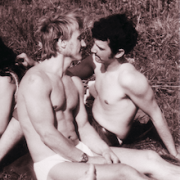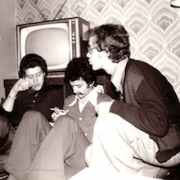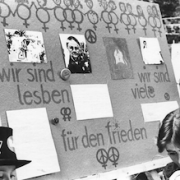
Between protest, emancipation, spying and a sense of belonging: the polyphonic cinema documentary "Out in East Berlin" tells the story of everyday gay and lesbian life in the GDR.
From today's perspective, the notorious anti-homosexual paragraph 175 of the penal code seems more than strange: A man who commits fornication with another man or allows himself to be abused by him for fornication shall be punished with imprisonment, was the wording of the stricter version introduced by the Nazis in 1935, which remained in force in the Federal Republic of Germany until 1969.
And it was less than 20 years ago that this paragraph, the basis for around 50,000 convictions of gay men in the Federal Republic, was deleted from the penal code without replacement. The end of this injustice was made possible by the harmonisation of East and West German criminal law, which turned gay Wessis into winners of reunification: In the GDR, homosexual acts between adults were already exempt from punishment from 1957, and in 1968 Paragraph 175 was abolished there and replaced by the newly created Paragraph 151, which criminalised sexual contact between homosexuals and minors.
So was life on the other side of the wall better, freer and more accepted as a homosexual? This question had already been Documentary film "Among Men - Gay in the GDR" in which the somewhat naive director Ringo Rösener was not able to find out much enlightening information from his interviewees.
The documentary "Out in East Berlin", which was produced at the same time and is now being released in cinemas, is far more productive, if only because of the wider variety of voices and portraits, and is also sometimes more surprising.
Filmmaker Jochen Hick ("The Good American", "Ich kenn keinen - Allein unter Heteros") and his co-writer Andreas Strohfeldt dispense with any off-screen commentary and just let the dozen protagonists tell their stories.

For example, the theologian Eduard Stapel. As an openly gay theologian, he was denied a pastorate, and as the organiser of homosexual working groups in parishes across the GDR, he came under the scrutiny of the State Security. They spared no effort, even investigating Stapel's sexual preferences and having suitably prepared "Romeo" agents get up close and personal with the supposed enemy of the state.
A lesbian group from Berlin-Prenzlauer Berg also had an unpleasant experience with state power. They actually only wanted to lay a wreath at a memorial service at the former Ravensbrück concentration camp in honour of the lesbian women murdered there. But the journey there ended in police custody.
Klaus Laabs, on the other hand, son of the State Secretary for National Education, was well on the way to making a political career like his father - until his homosexuality became known and the staunch socialist was expelled from the SED.
Contradictions and ruptures characterise most of the biographies and life plans that Hick and Strohfeldt outline in their film and place in a contemporary historical and socio-political context with footage from documentaries, feature films and GDR newsreels.

At the same time, it becomes clear how ambivalent the relationship between the state apparatus and homosexuality was and how torn the relationship between some gays and lesbians and the GDR was. Many of them were - initially - enthusiastic FDJ members and loyal party members. Some, like Michael Eggert, one of the co-founders of the Homosexual Interest Group Berlin (HIB), even believed that they could receive state support for the establishment of gay and lesbian organisations.
Others, such as Dieter Rausch and his partner Peter Bausdorf, had long since moved their gay life completely into the private sphere, appreciated the sense of community of the "enchanted" and celebrated exuberant parties even without an institutionalised subculture. The black and white pictures in her photo album are more than just private snapshots: Embedded in the memories of the enterprising male couple, a piece of everyday gay life becomes tangible.
Above all, however, these authentic images are among the rare testimonies to gay life in the GDR, as is a - from today's perspective - bizarre-looking Super 8 film by an HIB participant, a committed attempt at an educational film about homosexuals.

Another archive find by the two filmmakers is far more explosive: hidden photos taken by the Stasi of what was probably the only gay pride demonstration in the GDR. Peter Tatchell, today probably Britain's best-known homosexual activist, was the only openly gay delegation member to travel to the World Youth Festival in East Berlin in 1973. Gay pride and real socialism were by no means a contradiction for him. The Stasi probably saw it differently - and snatched his self-painted poster before he had even left the S-Bahn on his way to the big parade ...
"Out in East Berlin - Lesbians and Gays in the GDR". D 2013, directed by Jochen Hick and Andreas Strohfeldt. With Andreas Fux, Christian Puls, Eduard Stapel, Peter Tatchell, Klaus Laabs, Michael Eggert, Peter Rausch, Peter Bausdorf and others. 94 min., cinema release: 30 October.
Cinema trailer from "Out in East Berlin"
Previews and events for the cinema release of "Out in East Berlin":
- Berlin: 28.10. at 10 pm with both directors at Kino International
- Munich: 28.10. at 21.15 Preview at the Atelier in the City Kino
- Berlin: 30.10. at 8 pm with protagonists and team at the Babylon-Mitte cinema
- Berlin: 2.11. with directors at the Krokodil cinema
- Frankfurt/Main: 20.11. at 7 pm with Jochen Hick at the Orfeo cinema
- Stuttgart: 11.12. at 19.30 with Jochen Hick in the Atelier am Bollwerk
Link to the Website of the rental company with all current and future cinema dates









